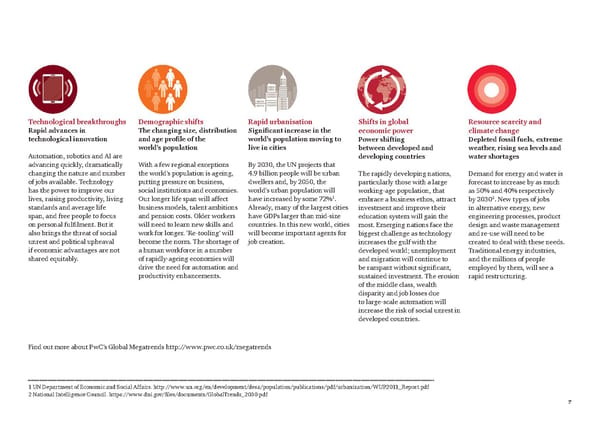7 Technological breakthroughs Rapid advances in technological innovation Automation, robotics and AI are advancing quickly, dramatically changing the nature and number of jobs available. Technology has the power to improve our lives, raising productivity, living standards and average life span, and free people to focus on personal fulfilment. But it also brings the threat of social unrest and political upheaval if economic advantages are not shared equitably. Demographic and social change Shift in global economic power Rapid urbanisation Climate change and r esource scarcity Technological breakthroughs Demographic shifts The changing size, distribution and age profile of the world’s population With a few regional exceptions the world’s population is ageing, putting pressure on business, social institutions and economies. Our longer life span will affect business models, talent ambitions and pension costs. Older workers will need to learn new skills and work for longer. ‘Re ‑ t ooling’ will become the norm. The shortage of a human workforce in a number of rapidly ‑ a geing economies will drive the need for automation and productivity enhancements. Demographic and social change Shift in global economic power Rapid urbanisation Climate change and r esource scarcity Technological breakthroughs Rapid urbanisation Significant increase in the world’s population moving to live in cities By 2030, the UN projects that 4.9 billion people will be urban dwellers and, by 2050, the world’s urban population will have increased by some 72% 1 . Already, many of the largest cities have GDPs larger than mid ‑ s ize countries. In this new world, cities will become important agents for job creation. Demographic and social change Shift in global economic power Rapid urbanisation Climate change and r esource scarcity Technological breakthroughs Shifts in global economic power Power shifting between developed and developing countries The rapidly developing nations, particularly those with a large working ‑ a ge population, that embrace a business ethos, attract investment and improve their education system will gain the most. Emerging nations face the biggest challenge as technology increases the gulf with the developed world; unemployment and migration will continue to be rampant without significant, sustained investment. The erosion of the middle class, wealth disparity and job losses due to large ‑ s cale automation will increase the risk of social unrest in developed countries. Resource scarcity and climate change Depleted fossil fuels, extreme weather, rising sea levels and water shortages Demand for energy and water is forecast to increase by as much as 50% and 40% respectively by 2030 2 . New types of jobs in alternative energy, new engineering processes, product design and waste management and re ‑ u se will need to be created to deal with these needs. Traditional energy industries, and the millions of people employed by them, will see a rapid restructuring. Demographic and social change Shift in global economic power Rapid urbanisation Climate change and r esource scarcity Technological breakthroughs Demographic and social change Shift in global economic power Rapid urbanisation Climate change and r esource scarcity Technological breakthroughs Find out more about PwC’s Global Megatrends http://www.pwc.co.uk/megatrends Demographic and social change Shift in global economic power Rapid urbanisation Climate change and r esource scarcity Technological breakthroughs 1 UN Department of Economic and Social Affairs. http://www.un.org/en/development/desa/population/publications/pdf/urbanization/WUP2011_Report.pdf 2 National Intelligence Council. https://www.dni.gov/files/documents/GlobalTrends_2030.pdf
 Workforce of the future Page 6 Page 8
Workforce of the future Page 6 Page 8